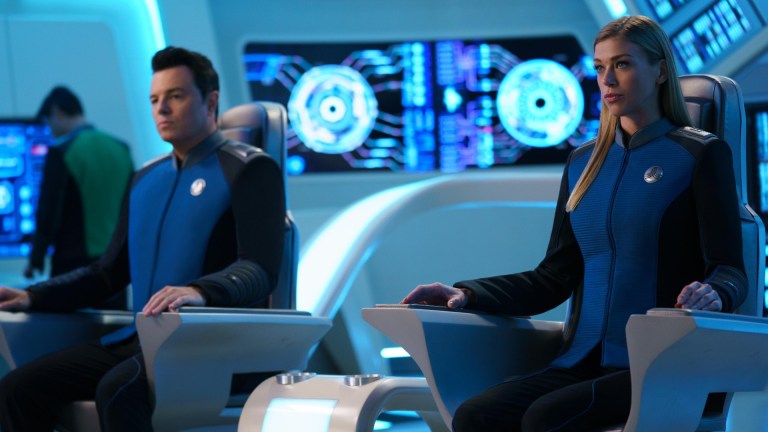The Orville: New Horizons Season 3 Episode 1 Review – Electric Sheep
The highly anticipated return of The Orville and her crew proves not only to be worth the wait, but that the time given was used wisely.

This review of The Orville: New Horizons contains spoilers.
The Orville: New Horizons Season 3 Episode 1
After a nearly three year hiatus, The Orville enters its ‘new horizon’, as it begins a new era streaming on Hulu. Yet, in the first episode of season 3, both the break and the new streaming platform already appear to be very good things for the future of the show. In what seems like a lifetime ago, season 2 of Seth MacFarlane’s star trekking, adventure-comedy found its voice, a voice that certainly differed from the satirical and often silly tone of the premiere season.
That dramatic shift in season 2 created a much stronger show, and with it, came a much more steadfast audience. Within the past three years since the conclusion of season 2, Disney acquired Orville parent company, Fox, and in an equally massive shift, we all experienced a global pandemic. The question on every fan’s mind after all that was what would season 3 have to show us?
Within the first ten minutes of the season 3 premiere, ‘Electric Sheep’, the simple answer to that question is: a lot.
Before the opening credits, audiences are treated to an action- packed recap of the battle between the combined forces of the Union and the Krill versus the Kaylon. The galactic battle scene reminds us just how massive this story thread was, and how much it changed the Orville universe.
As the battle cuts to inside the ship, Marcus Finn (BJ Tanner) runs through the Orville during the chaos. The lift he’s using suddenly breaks, sending him plummeting. Massive breaches in the hull suck Orville crew members into the gravity-free black abyss. Explosions ring out, lighting up the mayhem behind him. He finally finds his way home to find his younger brother, Ty (Kai Wener) where the two comfort one another while seeing the battle ensue outside. Isaac (Mark Jackson) enters, as Ty calls out to his friend. As Isaac gets closer, his blank robotic face lashes out in a monstrous visage.
It was just a dream.
This quick jump scare is a great way to set up one of the major threads of the episode, and what seems to be a major developing thread throughout the entire third season.
As we return to reality, The Orville, like many other Union ships, is being repaired and upgraded. LaMarr (J. Lee) comes into Isaac’s ‘quarters’ (the science lab) to say he’s running a diagnostic that will interrupt Isaac’s work. Isaac decides to go to a packed mess hall to join his crew mates since he has some time. He asks to sit with five young crew members who are reluctant to say he can sit with them, and clearly unhappy he’s there. As soon as Isaac sits, they all immediately leave.
One of the new crew members is Ensign Charly Burke (new cast regular Anne Winters), and only a moment passes before Burke comes back alone to have a pointed chat with Isaac. Burke asks Isaac if it feels bad that people are shunning him. Isaac reiterates that he’s noticed this is happening quite often, and he finds it interesting to study the crew’s behavior.
Burke tells Isaac the story of her previous deployment aboard the USS Quimby. There’s a flashback to Burke and her best friend Amanda trying to get to the Quimby’s escape pod during the aforementioned battle with the Kaylon. As the two friends make it to the escape pod, the damage is too severe. The pod launch mechanism jams and needs to be launched manually, and so Amanda sacrifices herself for Charly. Almost all the escape pods were destroyed and more than 300 Union crew people died on the Quimby.
Burke tells Isaac it’s a shame he can’t feel the pain. He deserves to feel all of it, as “It makes people sick to look at you”.
Winters’ debut as Charly is one of the most powerful character interactions within the three seasons of The Orville thus far. The tension between her and Isaac (predominantly on her side, as she’s the only one with emotion) is palpable, and immediately makes Burke the one character to watch this season.
As Isaac returns to his ‘quarters’, he barely gets back to work before he notices ‘MURDERER’ graffitied on the wall in red paint. Lieutenant Keyali (Jessica Szohr) begins her investigation, and calls down Captain Mercer (Seth MacFarlane) and Commander Grayson (Adrianne Palicki). As Talla reports on the situation, she informs her commanding officers that she’s seen the constant harassment and hatred that Isaac has endured, and that she even witnessed the recent conversation between Isaac and Burke.
Mercer calmly discusses the situation with Charly, and once again the tension fills the room. Burke, not afraid to speak her mind, reminds Mercer of how many Union citizens were lost to the Kaylon violence, and that Isaac is not to be trusted. What was an excellent touch from MacFarlane (having both written and directed this episode) is he often showed empathy to Burke’s point of view. Mercer himself admits that she may not be wrong. That while a captain should remain steadfast in his decisions, he cannot fully admit that he made the correct decision allowing Isaac to remain on board. Later in the show, even Lt. Malloy (Scott Grimes), the embodiment of joy and optimism on the Orville crew, shares with Burke that he often feels the same way she does.
As mentioned, there are certainly moments of brilliance throughout the premiere episode of season 3. MacFarlane’s script is poignant, political, topical and realistic, even when set in the subtextual environment of science-fiction. Those fans who immigrated from classic Star Trek and really gravitated towards The Orville in season 2 can be reassured that the more dramatic tone of the sophomore season, so far, continues in season 3.
Many of the threads of “Electric Sheep” seem reminiscent of Star Trek: The Next Generation, in the best way possible. MacFarlane has never been shy about his love for that show, and this premiere is a love letter to some of the classic story beats and character dynamics of TNG. Not to dwell on Burke (and yet she warrants the attention) but her introduction is akin to one of the strongest late additions to a preestablished cast; that of Ens. Ro, in the Next Generation’s played by Michelle Forbes.
Like Ro, Burke has a major chip on her shoulder. She creates tension among everyone, despite having smaller moments of connection. She challenges everyone, including her captain, and more importantly, she immediately makes an impact. Forbes did a tremendous job to gain interest and sympathy from an established core audience, and despite only being in 9 episodes in the final 4 seasons, the addition of Ro really changed up the dynamic. MacFarlane should be applauded for his writing, and for wanting to try new things when so many new things were already happening with the show, and Winters deserves tremendous praise for showing everyone both she and Burke belong.
Not to be lost in Burke’s debut is another powerful subplot, which features yet another stellar performance by television veteran Penny Johnson Jerald, who plays Dr. Claire Finn. During the investigation as to who painted the hate-filled epithet, it’s revealed that Marcus Finn was the culprit. Claire then has to deal with her own son turning on her former love interest and partner, and how to resolve her son’s growing hatred and Isaac’s cold and logical understanding of his affect on the crew. Her former family dynamic, already somewhat broken, is completely falling apart in front of her eyes.
In an episode where there are so many great debuts, new characters, new dynamics and even new technological toys for the crew to play with, MacFarlane pitches us a devastating curveball. Isaac wanders the halls of the Orville, even pausing to gaze out the window at the vast cosmos. Reflecting the Phillip Dick inspired title of the episode, it would seem no one knows the depths of Isaac’s inner-most thoughts, that even this emotionless Kaylon ‘dreams of electric sheep’ and can feel something on some level.
The scene fades back to Isaac’s lab as he leaves an engineering log about some of the other mechanical updates. As he seems to be wrapping up, he concludes with “I offer my best wishes to the Finn family,” extends his tendrils into a EM application module and commits suicide. Even when the suicide is perhaps lessened because of the science fiction aspect, the script is so compassionately tasteful towards victims of suicide, the mental health issues that those who feel suicide is necessary must suffer, and the effect it has on those they leave behind. MacFarlane’s script will certainly bring a tear to any fan’s eye, and his decision as director to leave so many of these impactful sequences without an accompanying score, makes the audience feel Isaac’s absence, and empathize with the characters that much more.
With each episode, it seems that MacFarlane and his team are finding a concrete footing and forging an extremely strong identity for the show. While still a loving tribute to the shows that impacted MacFarlane, and while The Orville started as almost a parody of Trek, as it has continued, it has become its own poignant creation, and “Electric Sheep” shows just how strong this show can be.
